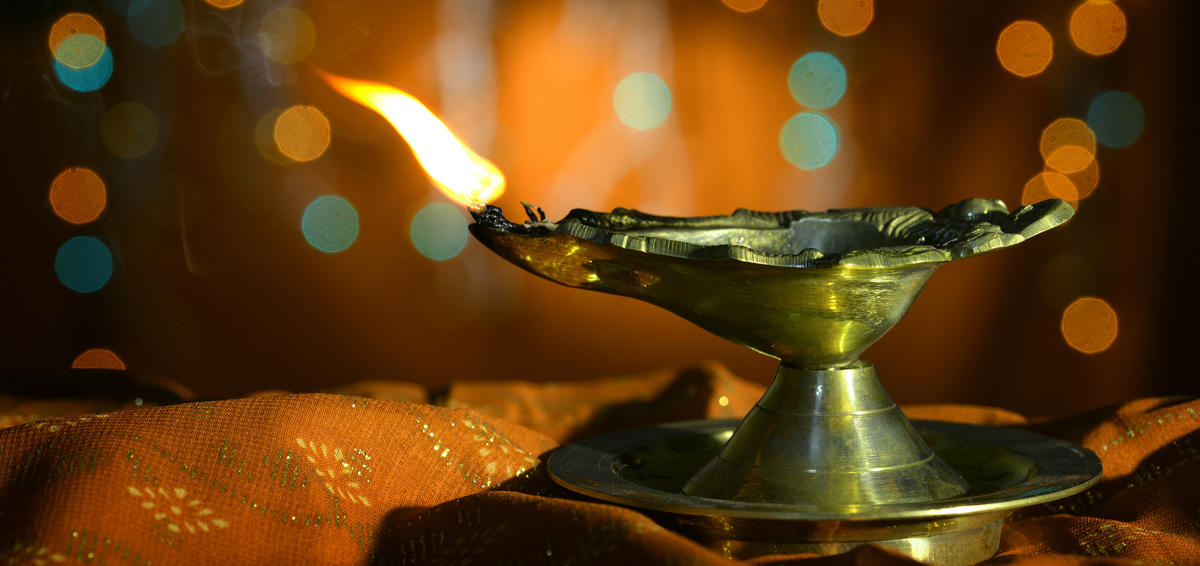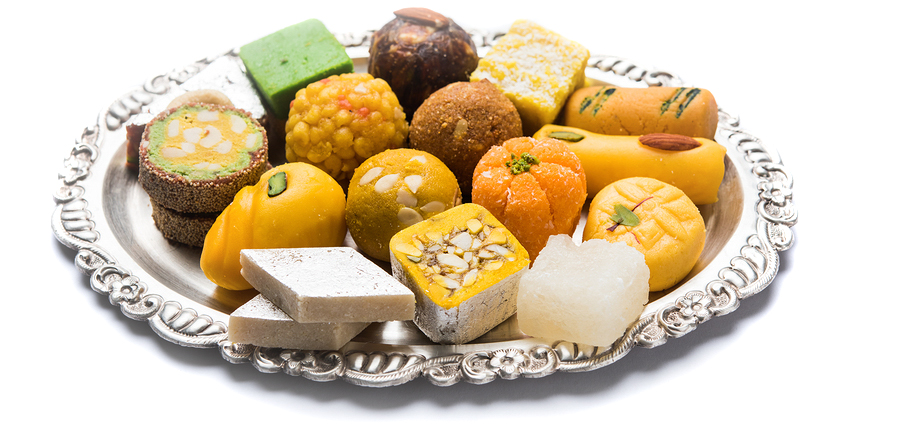The Song of Arati

The song of Arati, sometimes called “Jaya Jaya Arati,” is sung during the Ceremony of Light at the end of satsang (spiritual gathering) in the Sivananda tradition. During this closing ritual, simply known as Arati, lamps lit with fire are waved in front of various deities while ringing bells and chanting mantras to expel darkness and encourage self-realization.

The lamps are burned with camphor, a waxy aromatic substance derived from the wood of a type of evergreen tree. In Indian culture, camphor represents divine consciousness. When burned, it releases a sweet fragrance and melts without leaving any residue whatsoever. The process of burning camphor, therefore signifies the complete dissolution of the ego, leaving nothing but the fragrance of goodness and knowledge.
At the end of the prayer, participants briefly hover their palms over the flame to absorb its illuminating energy, then bring their cupped hands to the eyes and over the top of the head. These gestures symbolize the acceptance of clear vision, purity of thought and enlightenment. Prasad, a sacred offering consisting of sweets, nuts, fruits and other such foods are passed around after the ritual, suggesting a oneness with others and with the divine light.
Arati
Jaya jaya āratī Vighnavināyaka
Vighnavināyaka Srī Ganesha
We wave the light of victory to Ganesha, the all-auspicious remover of obstacles.
Jaya jaya āratī Subrahmanya
Subrahmanya Kārtikeya
We wave the light of victory to Subrahmanya, who is also named Kārtikeya.
Jaya jaya āratī Venugopāla
Venugopāla Venulola
Pāpavidūra navanīta chora
We wave the light of victory to Gopāla, the flute player, who tests our attachment to worldly pleasures and removes sins.
Jaya jaya āratī Venkataramana
Venkataramana Sankataharana
Sītā Rāma Rādhe shyāma
We wave the light of victory to Venkataramana, the remover of calamity, and to Sītārāma and Rādhesyāma.
Jaya jaya āratī Gaurī manohara
Gaurī manohara bhavānī shankara
Samba Sadāsiva Umā Maheshvara
We wave the light of victory to Gauri Manohara and various other forms of Lord Shiva.
Jaya jaya āratī Rāja Rājeshvarī
Rāja Rājeshvarī Tripura Sundarī
Mahā Lakshmi Mahā Sarasvatī
Mahā Kālī Mahā Shakti
We wave the light of victory to the Divine Mother, and all the various names she is known by.
Jaya jaya āratī Ānjaneya
Ānjaneya Hānūmanta
We wave the light of victory to Hanuman, the son of Anjaneya.
Jaya jaya āratī Dattātreya
Dattātreya Trimūrti avatāra
We wave the light of victory to Dattātreya, the sage who is the trinity of Brahma, Vishnu and Shiva.
Jaya jaya āratī Ādityāya
Ādityāya Bhāskrāya
We wave the light of victory to the Sun.
Jaya jaya āratī Senīshvaraya
Senīshvaraya Bhāskrāya
We wave the light of victory to the planet Saturn.
Jaya jaya āratī Shankarachārya
Shankarachārya advaita gurave
We wave the light of victory to Shankarachārya, the celebrated Guru of non-duality.
Jaya jaya āratī Sadguru nātha
Sadguru nātha Sivānanda
We wave the light of victory to Swami Sivananda.
Jaya jaya āratī Vishnudevānanda
Vishnudevānanda Vishnudevānanda
We wave the light of victory to Swami Vishnudevananda.
Jaya jaya āratī Agastya munaye
Agastya munaye srīrāmapriyāya
We wave the light of victory to the sage Agastya, who was cherished by Lord Rāma.
Jaya jaya āratī Ayyapā swāmiye
Ayyapā swāmiye dharmashastave
We wave the light of victory to Ayyapā swāmiye, the son of Vishnu and Shiva, who ruled all religions.
Jaya jaya āratī Jesus gurave
Moses gurave, Buddha gurave
We wave the light of victory to Jesus, the Buddha and Moses.
Jaya jaya āratī Mohammed gurave
Guru Nānak gurave
Samaste gurubhyo namaha
We wave the light of victory to Mohammed, Guru Nanak and all other gurus and prophets.
Jaya jaya āratī Venugopāla
We wave the light of victory to Gopāla, the flute player.
CLOSING SCRIPTURES
Om na tatra sūryo bhāti
Na chandratārakam
Nemā vidyuto bhānti kuto ‘yamagnih
Tameva bhāntam anubhāti sarvam
Tasya bhāsa sarvamidam vibhāti
The sun does not shine, neither do the moon, the stars nor lightning. So where does light come from? The Divine. When it shines, everything shines after it. By its light, everything else is lit.
Om gange cha yamune chaiva
Godāvari Saraswathi
Narmade Sindhu kāveri
Namastubhyam namo namaha
Salutations to the seven holy rivers: the Ganges, the Yamuna, the Godavari, the Sarasvati, the Narmada, the Indus and the Kaveri.
DEDICATION SONG
Tvameva mātācha pitā tvameva
Tvameva badhus cha sakhā tvameva
Tvameva vidyā dravinam tvameva
Tvameva sarvam mama devadeva
O God of Gods, thou art my mother, my father, my relative, my friend, my learning, my wealth and my everything.
Kāyena vāchā manesendriyairvā
Buddhyātmanā vā prakrtessvabhāvāt
Karomi yadyat sakalam parasmai
Nārāyanāyeti samarpayāmi
Whatever actions I perform with my body, speech, mind, senses, intellect, nature or emotions, I dedicate them to the Supreme Lord.
Sarva dharmān parityajya
Māmakeam sharanam vraja
Aham tvā sarva pāpebhyah
Moksayisyāmi mā suchah
Abandoning all duties, take refuge in the Lord alone and you will be liberated from all sins. Do not worry.
(The Bhagavad Gita XVIII, 66)

I enjoy practicing yoga, and sometimes, even just being mindful is a very healing experience. This is a beautiful prayer! I have four little ones, so do you have any recommendations for how I can practice at home but still have the same experience as being in a studio?
Practicing at home is very feasible, even with the kids around. The trick is to create a space for yourself!
I think you may find this article useful for your own practice.
Let me know how it goes!
Thanks for sharing about Arati. Is this ritual practiced all over the world? I’ve always wanted to try yoga but haven’t found the time to. Is there any simple yoga practice that I can do at home?
You’re welcome Yvonne! Yes, Arati is a ritual that is practiced all over the world, particularly in Hindu communities and within ashrams.
And there are definitely simple practices that you can do at home. It might be a good idea to join a class first and see if there are any specific recommendations that apply to you. After that, you can practice safely at home. Enjoy!